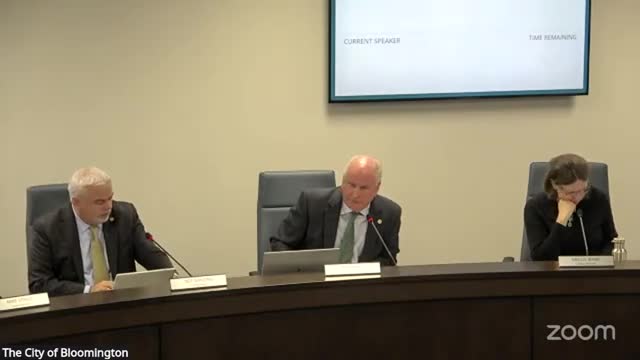Council approves IAFF Local 49 contract, moves department to 24/72 shift schedule
Get AI-powered insights, summaries, and transcripts
Subscribe
Summary
Bloomington approved a collective bargaining agreement on Oct. 13 with IAFF Local 49 that moves the fire department from a 24/48 to a 24/72 shift schedule, a change officials say will reduce firefighter fatigue and improve retention.
The Bloomington City Council on Oct. 13 approved a collective bargaining agreement with IAFF Local 49 that includes a transition to a 24/72 shift schedule for the Bloomington Fire Department.
City Manager Jurgens introduced the item and Fire Chief Corey Matheny and Local 49 President Eric Hall detailed the operational and health reasons behind the change. “This agreement reflects nearly 10 months of collaboration with Local 49 focused on balancing operational needs, fiscal responsibility, and most importantly the health and safety of our firefighters,” Matheny said.
The contract restructures the existing workforce to establish a fourth shift without a large expansion of staff. Matheny said the department will carry forward two firefighter positions added in FY 2026 to help form the fourth shift and that the change is intended to be implemented beginning in 2026.
Under city presentations, the department’s minimum daily staffing requirement is 29 firefighters per shift; when fully staffed the department assigns about 38 people to each shift to cover leave, training and other absences. The reorganization will reallocate the surplus positions across shifts to create the fourth shift. Matheny said firefighters will occasionally work “debit days” (extra scheduled days) to cover absences: roughly 10 extra days per year under the new schedule in the first two years, declining to about six days per year by 2028.
Chief Matheny explained why the schedule change was proposed: call volume has risen by more than 30 percent in the last five years while staffing levels remained largely unchanged, and research links long, irregular schedules to sleep disruption and increased long-term health risks for firefighters. “By moving from 3 shifts to 4, each firefighter will respond to roughly 25% fewer incidents over the course of a year,” Matheny said.
Local 49 President Eric Hall praised the negotiated agreement. “This change is more than a scheduling adjustment. It's an investment in the health and safety and longevity of our firefighters,” Hall said.
Council member Hendricks moved approval; member Ward seconded. The council recorded no nays and the contract was adopted.
Why it matters: The new schedule is a personnel and operational change intended to reduce fatigue, improve retention and lower long-term health risks for firefighters. The city said the change is to be achieved mainly by realigning existing positions and will preserve consistent emergency-response staffing citywide.
Next steps: Staff and Local 49 will implement the scheduling transition beginning in 2026; the city said two FY 2026 positions will be carried forward to support the fourth shift and staff will manage implementation details, including the use of debit days and leave adjustments.
